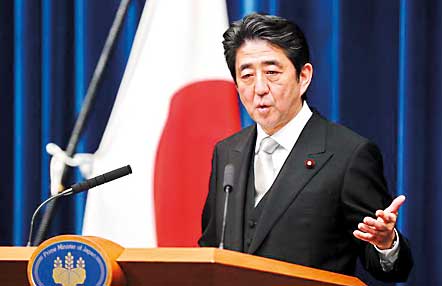Sunday Feb 22, 2026
Sunday Feb 22, 2026
Thursday, 21 April 2016 00:00 - - {{hitsCtrl.values.hits}}
 By Hishan Welmilla in USA
By Hishan Welmilla in USA
The summit of Group of Seven (G7) nations which will host in May should send a clear signal that it is prepared to take steps to support the weak global economy said Japanese Prime Minister Shinzo Abe.
“Given that weakness, the G7 meeting should send a clear message to the world so that those countries will make a contribution to the sustainable growth of the world economy,” he said, speaking on the sidelines of the nuclear security summit in Washington.
The Japanese premier said the G7 summit should also take up ‘in a strategic way’ issues such as global terrorism, Russia, Ukraine’s conflict and the threat posed by North Korea’s nuclear ambitions.
Apart from that at this year’s summit, the Japanese government plans to focus on the challenges facing the Asia-Pacific region. Tokyo is expected to invite leaders of the major countries in the region to a meeting of G7 with the theme ‘linking for development’.
Under the Presidency of Japan, the 2016 Ise-Shima Summit will discuss measures to address the global economic slowdown, terrorism, the humanitarian crisis and ongoing conflicts.
The seven countries invited to the meeting and Sri Lankan President Maithripala Sirisena was also among the invited world leaders and it will be the first time a Sri Lankan leader is taking part in the summit. Indonesia, Laos, Vietnam, Bangladesh and Papua New Guinea will also be invited.
UN Secretary General Ban Ki-moon and the heads of the relevant international organisations are expected to attend the G7 Summit.
The 2016 Group of 7 (G7) Summit will take place on 26 and 27 May in GIse-Shima, Mie Prefecture, Japan. This is the 42nd summit and also it will be the first time an Asian country has the privilege of hosting after eight years.
Separate meetings of G7 ministers will also take place through the year at various locations around Japan, including meetings of foreign, finance, agriculture, ICT, energy, education, science and technology, environment, health and transport ministers.
The group, which includes the United States, Italy, Germany, Japan, Britain, France, Canada and France, cut Russia from the G8 in 2014 after Moscow annexed Crimea. The G7 was officially established in 1985 to facilitate economic cooperation among the world’s largest industrial nations; summit meetings of the member nations began in 1975.